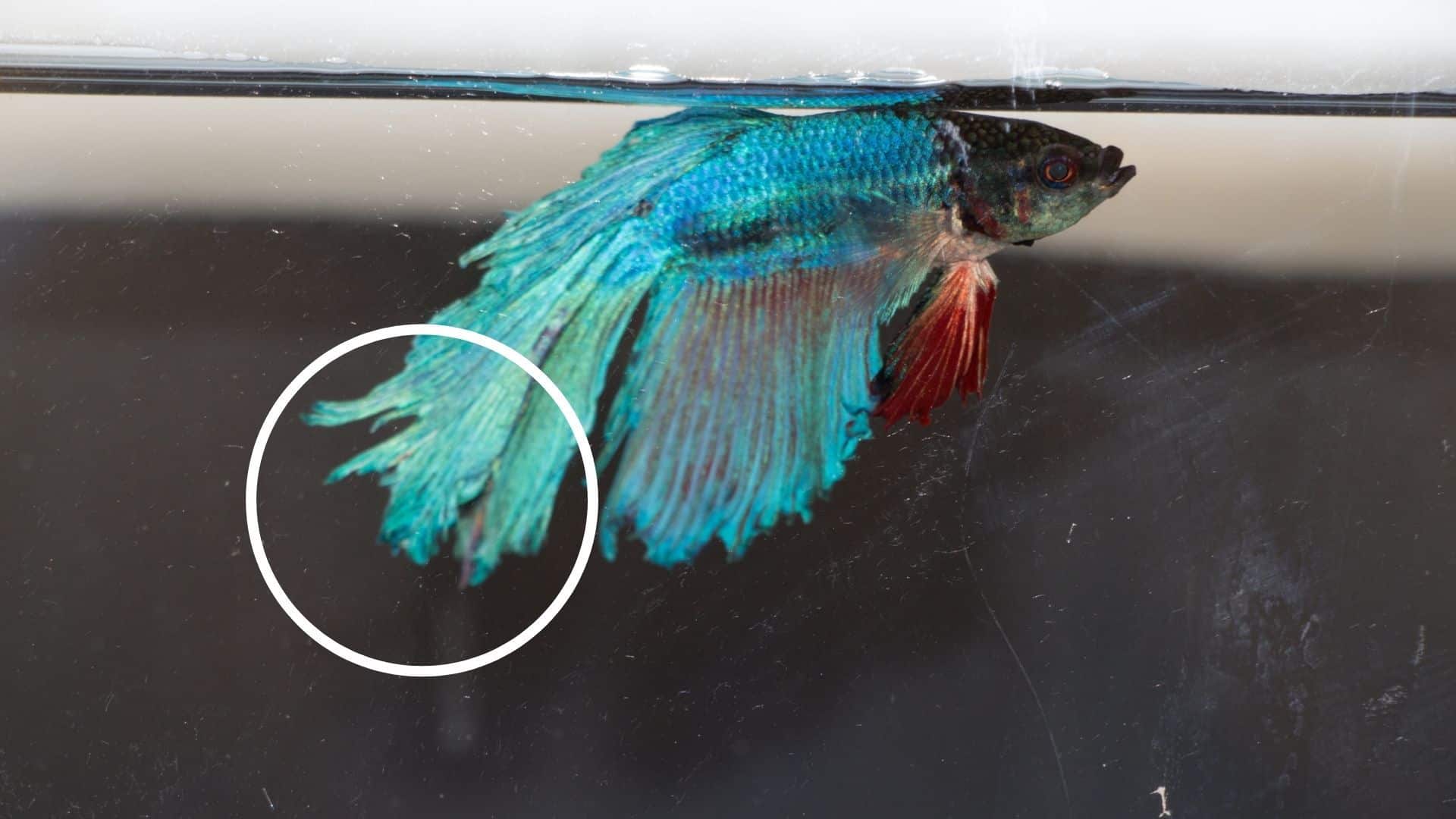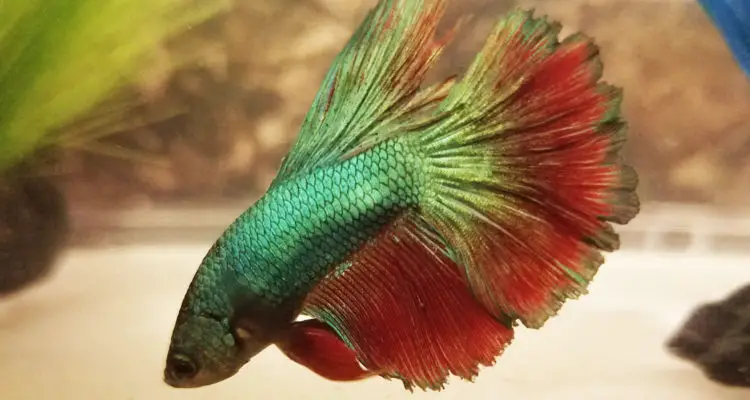Betta fish, also known as Siamese fighting fish, are popular pets for their vibrant colors and fascinating behaviors. However, as with any pet, betta fish can fall ill and require attention and care from their owners. One common issue that betta fish owners may encounter is tail splitting, which can be alarming and concerning. In this article, we will explore the causes of betta fish tail splitting and provide remedies to help your fish recover and regain its health.
A Betta fish tail split can be caused by poor water quality, fin rot, or physical injury. To prevent tail splitting, maintain a clean and properly filtered tank and avoid overcrowding. To remedy a split tail, add aquarium salt to the water and treat with antibiotics if necessary. Regular water changes and a balanced diet can also promote fin health in Betta fish.

Betta Fish Tail Split: Causes and Remedies
Betta fish, also known as Siamese fighting fish, are popular aquarium pets due to their vibrant colors and playful personalities. However, one common health issue that betta fish owners may encounter is tail splitting. Betta fish tail split can be caused by various factors, and it’s important to understand the root cause to provide the right remedy to prevent further damage.
Causes of Betta Fish Tail Split
Betta fish tail split can have several causes, including:
1. Poor water quality
Poor water quality can cause fin rot, which can lead to tail splitting in betta fish. This is often due to insufficient water changes or overfeeding, leading to high levels of ammonia and nitrate in the tank water.
2. Aggressive tank mates
Betta fish are known for their aggressive nature, and housing them with other aggressive fish can cause stress, which can lead to tail splitting.
3. Sharp decorations or plants
Sharp decorations, such as plastic plants or sharp rocks, can tear the delicate fins of betta fish and cause tail splitting.
Remedies for Betta Fish Tail Split
If you notice that your betta fish’s tail is splitting, there are several remedies that you can try:
1. Improve water quality
The first step in treating betta fish tail split is to improve the water quality of the tank. This can be done by performing regular water changes and testing the water for ammonia, nitrate, and pH levels.
2. Remove aggressive tank mates
If your betta fish is housed with aggressive tank mates, consider removing them to reduce stress and prevent further tail splitting.
3. Smooth out sharp decorations
If you have sharp decorations or plants in the tank, remove them or smooth out the edges to prevent further damage to your betta fish’s fins.
4. Use medication
If the tail split is severe, you may need to use medication to treat the infection and promote healing. There are several medications available that can be added to the tank water to treat fin rot and prevent further damage.
Benefits of Treating Betta Fish Tail Split
Treating betta fish tail split is important not only for the well-being of your fish but also for the aesthetic value of your tank. A healthy and vibrant betta fish with a full and flowing tail is a beautiful sight to behold.
Betta Fish Tail Split vs. Fin Rot
Betta fish tail split is often mistaken for fin rot, which is a bacterial infection that can cause the fins to deteriorate. While both conditions can cause the fins to split, fin rot is more serious and can lead to further health complications. If you suspect that your betta fish has fin rot, it’s important to seek immediate treatment from a veterinarian or pet store professional.
Conclusion
Betta fish tail split can be caused by a variety of factors, including poor water quality, aggressive tank mates, and sharp decorations. By understanding the cause of tail split and providing the right remedy, you can prevent further damage and ensure the health and well-being of your betta fish. Regular water changes, testing the water quality, and removing aggressive tank mates are some of the steps you can take to prevent tail splitting and promote healing. If the tail split is severe, medication may be necessary to treat the infection and promote healing. Remember, a healthy and vibrant betta fish is a beautiful addition to any aquarium.
Frequently Asked Questions
Betta fish are one of the most popular fish kept in aquariums. However, betta fish tail split can be a common issue faced by the owners. Here are some frequently asked questions about the causes and remedies of betta fish tail split.
What causes betta fish tail split?
Betta fish tail split can be caused by various factors such as poor water quality, rough handling during transportation, or aggressive behavior towards other fish. Poor water quality can lead to fin rot, which weakens the fins and makes them more prone to splitting. Rough handling during transportation can cause the fins to tear, while aggressive behavior towards other fish can result in fin nipping.
In addition, the wrong type of aquarium decorations can also cause betta fish tail split. Sharp or rough decorations can damage the fins, while plastic plants with sharp edges can also cause tearing.
How can I prevent betta fish tail split?
One of the best ways to prevent betta fish tail split is to maintain good water quality. Regular water changes and proper filtration can help prevent fin rot. When transporting your betta fish, make sure to handle them gently to avoid any damage to the fins.
Be mindful of the aquarium decorations you choose. Avoid any sharp or rough decorations and opt for soft, silk plants instead of plastic ones. Providing enough space for your betta fish can also help prevent aggressive behavior towards other fish.
Can betta fish tail split heal on its own?
In some cases, betta fish tail split can heal on its own. However, it is important to address the underlying cause of the split to prevent further damage to the fins. If the split is due to poor water quality, make sure to improve it. If it is due to aggressive behavior towards other fish, consider separating the fish or providing more space.
If the split is severe, you may need to treat it with medication. Bettafix and Melafix are commonly used to treat fin rot and promote fin regrowth. However, make sure to follow the instructions carefully and monitor your fish closely during treatment.
How long does it take for betta fish tail split to heal?
The time it takes for betta fish tail split to heal depends on the severity of the split and the underlying cause. In some cases, the fins can heal within a few days. However, more severe splits may take several weeks to heal. It is important to monitor your fish closely and make sure they are not further damaging their fins.
Additionally, providing a healthy and stress-free environment can help speed up the healing process. Avoid making any sudden changes to the aquarium and make sure your betta fish have enough space and hiding places.
Can betta fish tail split be a sign of a more serious health issue?
While betta fish tail split is a common issue, it can also be a sign of a more serious health issue. For example, if the split is accompanied by other symptoms such as lethargy, loss of appetite, or discoloration, it could be a sign of an infection or disease.
If you notice any other unusual symptoms or if the split does not heal despite proper care and treatment, it is best to consult a veterinarian or a fish expert for advice.

How to Cure Fin Rot the EASY Way!
In conclusion, it’s important to understand the causes and remedies for Betta fish tail split so that you can provide the best care for your pet. Prevention is always better than cure, so make sure to maintain the water quality and temperature in your Betta fish tank. Avoid overcrowding and aggressive tank mates that can stress your Betta fish.
If your Betta fish does develop tail split, don’t panic. There are several remedies you can try, such as using aquarium salt, medication, and clean water changes. However, it’s essential to identify the underlying cause of the tail split to prevent it from happening again in the future.
Remember, Betta fish are delightful pets that require proper care and attention to thrive. By following these tips and taking preventative measures, you can ensure that your Betta fish remains healthy, happy, and beautiful for many years to come.
